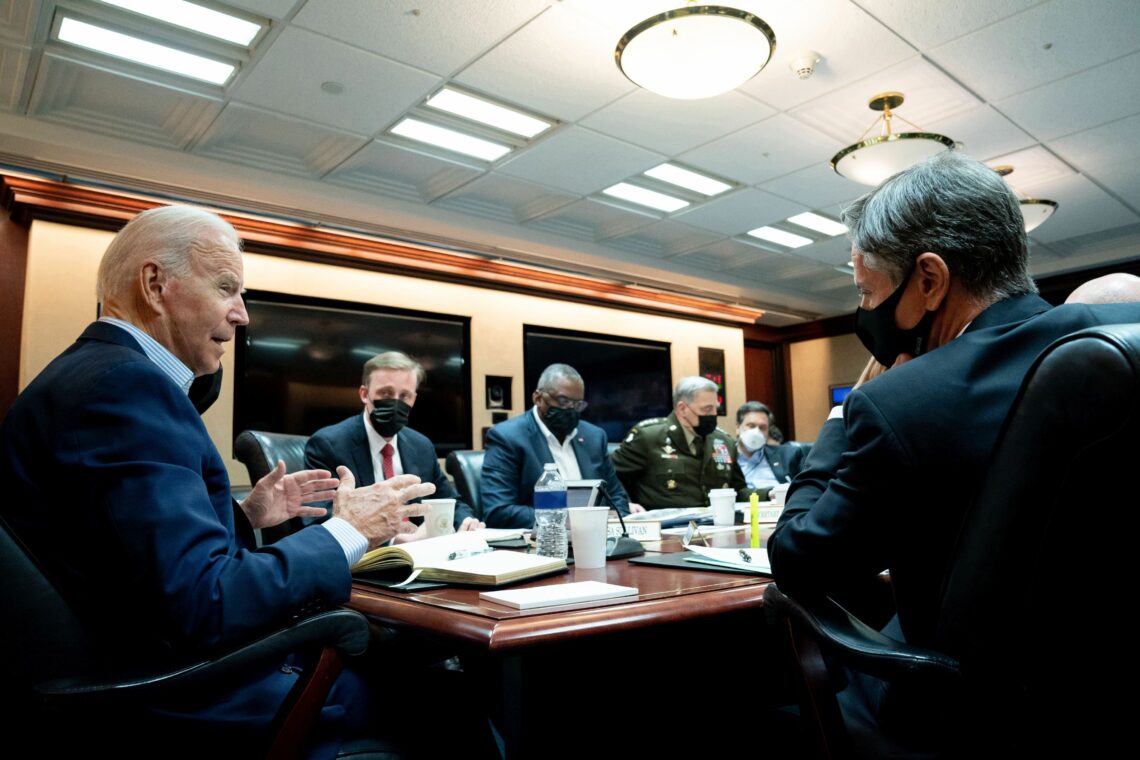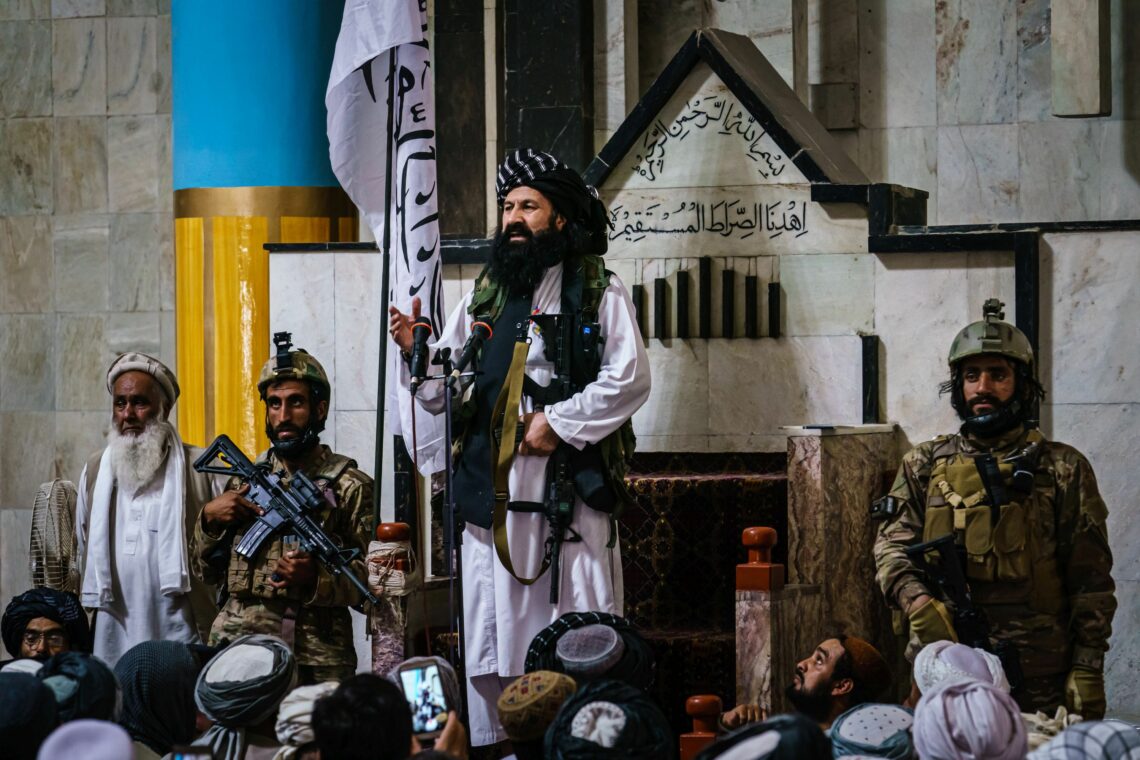Scenarios for Biden’s counterterrorism strategy
With Afghanistan in the hands of the Taliban, international terrorism has become an even bigger challenge for the Biden administration. The White House wants to outsource counterterrorism to regional partners – a questionable strategy.

In a nutshell
- The Taliban is unlikely to work with the U.S.
- Outsourcing counterterrorism has serious limitations
- There is little consensus in the U.S. on how to handle threats
With the Taliban takeover of Afghanistan, there are renewed concerns about a resurgence of global Islamist terrorism. It is a crucial issue for American foreign and national security policy, and President Joe Biden’s approach is set to evolve over the next few months.
The forthcoming National Security and National Defense strategies – due late this year or early next year – will establish the framework for the administration’s moves going forward. However, the White House is unlikely to develop an aggressive campaign to tackle transnational terrorism like the one initiated by former President George W. Bush.
After Afghanistan
The Biden administration has acknowledged that Afghanistan could become a terrorist sanctuary again, though not in the short term. Recently, one United States official said that it would take at least five years for terrorist groups to regain capabilities of organizing an attack as large as the ones perpetrated by al-Qaeda on September 11, 2001.
It seems clear that, at least initially, the administration plans to try to work with the Taliban to mitigate the terrorism threat. The White House believes it has leverage over the organization, which will need international recognition, aid and assistance to rebuild Afghanistan.
The Taliban do not need the Americans.
This strategy will most likely fail, but Washington will be slow to abandon it. If the administration’s working relationship with the Taliban appears to reduce the threat of terror attacks, it will stem some of the criticism surrounding the humiliating withdrawal from Kabul.
However, the Taliban do not need the Americans. They can already count on international support through Russia, China and Pakistan. They have sources of revenue, including a highly lucrative narcotics trade. The Taliban’s connections with al-Qaeda, the Haqqani network and Pakistan’s intelligence service, the ISI, run too deep for them to make compromises with Washington.
U.S.-Pakistan
The administration will also struggle to form a coherent strategy for dealing with Pakistan. The U.S. has long maintained relations with Pakistan even though the ISI and the Pakistani military retain ties with the Taliban and regional terrorist organizations. Nevertheless, Washington orthodoxy holds that the relationship should continue. That policy, however, may not be sustainable.
More voices in Washington are arguing the bilateral relationship is in jeopardy. They point to Pakistani support for the Taliban and Islamabad’s growing ties with Beijing. On the other hand, some say that the U.S. cannot ignore relations with a nuclear-armed Pakistan and that Washington needs Islamabad’s connections to deal with terror threats. The tension between these views will grow over time and the administration does not seem to have a clear notion of how to reconcile them. What is certain is that U.S. influence over Pakistan is waning. The administration is undecided about how to respond.

‘Over the horizon’
The Biden administration prefers to outsource counterterrorism to regional partners and limit U.S. efforts to preemptive or retaliatory strikes from outside of the areas where the terrorists are based – the term it uses is “over the horizon.” It is not surprising that the White House has adopted this strategy, as it is nearly the same as the one the Obama administration implemented. Many members of the Biden team for defense and foreign policy also served under President Obama.
The question is whether this posture is practicable. In South Asia, for example, neither the U.S. nor any of its allies has basing options that would allow for robust counterterrorism operations. Similarly, it is unlikely that any Central Asian nation would agree to host a U.S. military base in the near term.
Other regions are equally problematic. The administration wants to reduce its footprint in the Middle East and Africa to focus on countering China in the Indo-Pacific. Yet doing so will undermine efforts to secure strong partnerships and conduct counterterrorism operations.
While the White House was working on a new global force posture, they presumed the threat of international terrorism was waning. Now they have to decide if their premise is still valid – and if not, what to do about it. Resolving these issues will not be easy for the Biden team.
The Iran problem
The administration remains determined to normalize relations with Iran. This too will run counter to global counterterrorism efforts. There is every expectation that senior al-Qaeda operatives will be allowed to move from Iran back to Afghanistan.
There is every reason to believe that Tehran will remain the world’s leading state sponsor of terrorism.
Even if the U.S. reenters the Joint Comprehensive Plan of Action (JCPOA, or the Iran nuclear deal), Tehran will not extend cooperation to counterterrorism and there is every reason to believe that it will remain the world’s leading state sponsor of terrorism. If the U.S. continues to move toward normalizing relations with Iran, it could therefore exacerbate the terrorist challenge.
Domestic security
Homeland security has become highly politicized in the U.S. This will complicate efforts to establish an integrated counterterrorism strategy.
For example, the administration remains committed to immigration-friendly policies on the U.S.-Mexico border. Critics will increasingly argue that tens of thousands of illegal border crossings each month create an unacceptable security risk. However, the White House is loath to reverse policies and damage domestic constituencies that favor more open borders.
The White House faces a similar conundrum in domestic counterterrorism operations. The Biden administration has overwhelmingly favored focusing on potential terror threats that have a domestic political component. President Biden’s critics argue that the administration is using the Departments of Homeland Security and Justice to demonize, persecute and marginalize political opponents. In contrast, many in the president’s party see counterterrorism operations focused on Islamist extremists as prejudiced against Muslims.
Consequently, there is little consensus in the U.S. on terrorist threats. Whatever strategy the administration adopts is bound to bring criticism and controversy.
Great power competition
Domestic and international critics have argued that the Biden administration’s ability to work with allies has been significantly damaged by the disaster in Afghanistan and its poor coordination with partner nations. When it comes to counterterrorism, however, this criticism only goes so far. These nations are also worried that they will be targeted by Islamist terrorists and are unlikely to make themselves more vulnerable by not actively cooperating with the U.S.
Neither China nor Russia are likely to become major sponsors of transnational terrorism to weaken the U.S. That said, both will hope that a renewed terror threat will demand Washington’s attention. They will certainly not partner with the U.S. in combating transnational terrorism.
So far, the issue of transnational terrorism has been absent from the debate over great power competition strategy.
This dynamic presents yet another complex challenge for the administration. Many in Washington argue the U.S should focus on great power competition. Some want to focus exclusively on China. So far, the issue of transnational terrorism has been absent from the debate over great power competition strategy.
For its part, the Biden White House intended to place less focus on hard power and adopt a less confrontational “compete-cooperate” model with both Beijing and Moscow. Organizing global counterterrorism operations complicates this strategy. They would prefer China and Russia to act as good-faith partners. They will not. Still, the Biden team is likely to make a sincere effort. That will take time and further slow the development of the U.S. counterterrorism strategy.
Scenarios
As it moves to adopt a new counterterrorism strategy in light of the setbacks in Afghanistan, the administration faces several hurdles. Among these are the lack of domestic consensus, reluctance to reembrace the global war on terror, and policies that favor disengagement from trouble spots.
The most likely scenario is that the U.S. will be tentative and develop its post-Afghanistan counterterrorism operations ad hoc. The Biden team will attempt to shoehorn future efforts into its strategic concept of disengagement and ameliorating the great power competition with Russia and China, while focusing mostly on domestic issues.
Dramatic political reversals or high-profile terrorist attacks could force the administration to adopt a more aggressive posture – but it would not be by choice. The result will be U.S. counterterrorism operations that are more reactive than proactive for the foreseeable future.







